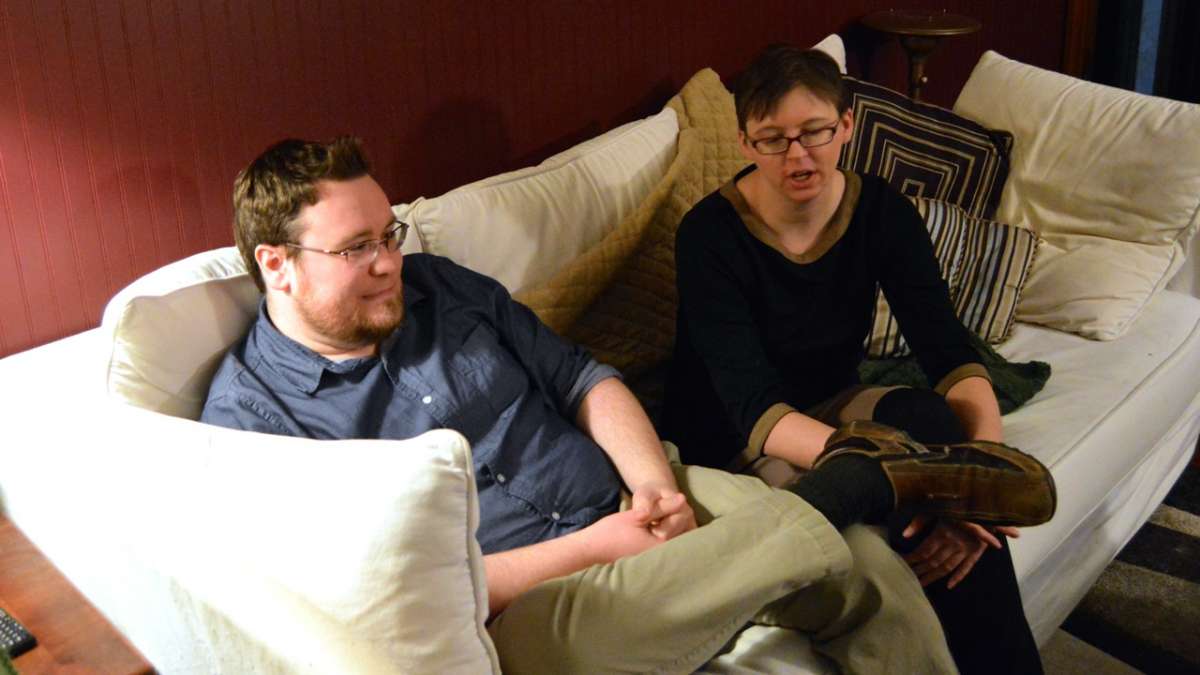Are young municipal workers bearing the brunt of pension reform?
Listen-

Courtney and Alex Hayden at home.
-

Courtney said she and Alex try hard to live simply so they can first pay off their student debts and then start putting away more money for the future. (Kate Lao Shaffner/WPSU)
-

We're hedging our bets as best as we can by spending responsibly when we have to spend and saving up otherwise, so that hopefully we can take care of ourselves come the end of days.' (Kate Lao Shaffner/WPSU)
-

Courtney Hayden said she loves her job and she didn't take it because of the benefits or even the salary. 'I wanted to be a public servant,' she said. (Kate Lao Shaffner/WPSU)
-

You can't take away promises that you've made to current employees. So the only thing you can do is take incoming employees and offer less, give less. That's just the way it works.' (Kate Lao Shaffner/WPSU)
For municipalities, reforming pensions often means changing retirement benefits for the newest workers.
Many Pennsylvania municipalities are already taking steps towards reforming their pension plans. Because municipalities cannot legally break pension obligations already promised, reform usually means changing the pension plans for new employees while older employees’ pensions remain intact. So what does that mean? Is the younger generation bearing the brunt of pension reform?
Set for life
Courtney and Alex Hayden live in a house just outside the Borough of State College with their two cats.
Alex works two part-time IT jobs while looking for full-time work and Courtney makes about $50,000 dollars a year as the communications coordinator for the State College municipal government. They have no complaints about Courtney’s salary, but they can’t help but worry about finances because of the poor job market for Alex, Courtney’s chronic health issues, and their big student loans.
And they’re really trying hard to plan for their future. One perk of Courtney’s job is the benefits…but even working for the government doesn’t guarantee future financial security.
Alex said back in the day, a government job meant “you’re set for life.” But now, he said, it’s not the same.
New terms for new hires
Courtney, who’s 29, started working for the State College Borough in 2011, just as the borough changed its retirement benefits for non-uniformed workers (everyone but the police). While those employees used to have a defined-benefit pension, where employees could expect a certain monthly income after retirement, new hires were shifted to a defined-contribution, 401(k)-type plan. The difference is instead of guaranteeing that monthly income after retirement, the borough now just guarantees a contribution every month during the length of employment.
Essentially, it transfers market risk from the employer to the employee.
“It is kind of weird to know that someone working right next to me has the defined benefit plan and I have the defined contribution plan,” said Courtney. “It’s just a little awkward.”
Courtney says she doesn’t take it personally that her retirement benefits are different from some of her coworkers. She has a master’s degree in public affairs and knows what a problem underfunded pensions can be.
“I could just see that it was unsustainable to guarantee that you’ll be able to protect someone in a volatile market and a volatile economy,” she said. “So when I got out of school I didn’t expect that I’d have that kind of relationship with my employer. I didn’t expect that they’d be able to guarantee me those things.”
Courtney points out that some of her colleagues prefer defined-contribution plans because they’re portable. For many people her age, the thought of staying put for an entire career isn’t all that appealing. And she says others like having some control over their investments.
But Courtney says she would’ve preferred a defined-benefit plan because it provides more security.
Better than nothing
Alex has a harder time accepting the changes, which he sees as indicative of deeper problems. He says he feels like his generation is paying for the financial short-sightedness of his predecessors.
Does it make him mad?
“Yeah. I would say–at times, I’ve honestly been somewhat wrathful about it,” he said.
Alex says younger workers can’t expect the comfortable retirement older workers considered a given. And yet today’s generation is still on the hook to fund those cushy pensions.
“We’re getting the short end of the stick, but right now we have a stick,” said Alex. “At least it’s better than nothing.”
It’s a trend
State College Borough Manager Tom Fountaine said the borough’s pension fund is relatively well-funded at around 80 percent, but decision-makers knew pensions costs were rising and wanted to be proactive. The borough switched to defined contribution plans for non-uniformed workers in January of 2011.
“We moved to a defined contribution plan in order to help control costs over the long run with our pension plan,” said Fountaine.
Many municipalities have gotten in trouble because the money they’d put aside for promised pensions ultimately hasn’t been enough when it comes time to actually pay out those pensions. For many municipalities, the answer is switching new employees to a 401(k) style plan because that means the municipalities’ obligation is limited to a defined monthly contribution–and that’s it. Plus, state law protects pensions already promised–municipalities can’t just go back and renege on their obligations to former and current employees.
State College is hardly alone in choosing to reform pensions by applying changes to new, often younger workers.
Jean-Pierre Aubry, the assistant director of state and local research at Boston College’s Center for Retirement Research said that’s exactly the pattern.
“You do have a burden of the unfunded liability being shifted to new employees or young employees through a decrease in their benefits,” he said.
Aubry says traditionally, people were drawn to government jobs because the great benefits made up for a smaller salary. But increasingly, government benefits have started to look like private sector benefits—less generous—but without the bigger salary to make up for it.
“Any rational individual would make the decision with their skill sets to go to the private sector, said Aubry.
Public service
Courtney, at least, is an exception. She says she’s not in her job for the money or the benefits.
“I didn’t choose to go into local government to have a comfortable life,” said Courtney. “I wanted to be a public servant.”
She said she loves her job. And she said for people like her, who entered the workforce around the time of the financial crisis, there’s also the attitude that you have to be grateful to have a job, period.
Courtney faithfully puts money into her retirement account every month—matched by the borough’s contributions—although she wishes she could put away more. She keeps close tabs on the projected numbers.
“If I continue with what I’m currently doing, even in a good market, I won’t make it to my desired income,” she said. Her paperwork shows she’d get about $30,000 a year, which Courtney said isn’t too bad.
But in a poor market? “Oh, my,” said Courtney. “We’d be able to manage. But it would just be managing.”
WHYY is your source for fact-based, in-depth journalism and information. As a nonprofit organization, we rely on financial support from readers like you. Please give today.



